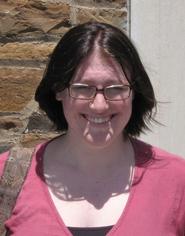
Nietzsche and religious studies may not seem like the most logical companions, but for Deborah Pless '09 (Rockport, Mass.), the tension between them is fascinating. While other students have left the Hill for summer jobs and internships, Pless is researching "Nietzsche and the Dying-Reviving Cycle," a collaborative project with Associate Professor of Philosophy Todd Franklin funded by the Emerson Foundation Grant program.
Created in 1997, the Emerson program was designed to provide students with significant opportunities to work collaboratively with faculty members, researching an area of interest. The recipients, covering a range of topics, are exploring fieldwork, laboratory and library research, and the development of teaching materials. The students will make public presentations of their research throughout the academic year.
Pless' project investigates Nietzsche's objections and general view of religion, especially in relation to three dying and reviving gods – the Sumerian earth goddess Inanna, the Greek cult god Adonis, and Jesus Christ – and discusses their relevance as moral examples. Pless is reading religious texts such as the Gospel of Nichodemus and the Hymns of Inanna, as well as reading the works of Nietzsche. Adonis is particularly difficult to research, she says, since as a mystery cult god, there is no single, definitive tradition about him.
Now in the latter stages of her project, Pless has found a crucial difference between the figures she is studying, which she terms as a difference in religious function. While the goddess Inanna justified humanity, Pless explains, Christ's importance lies in redeeming it. This is the fundamental problem Nietzsche has with Christian belief, since it implies that something was wrong with humanity before the redemption, an idea that Nietzschean philosophy will not allow. Adonis, however, works as the ideal middle road between justification and redemption for Nietszche, as an example of how people should live and what they should do.
Pless has been working on this research through several terms, having first come across the idea of dying and reviving gods while auditing a class on vampires. When she took another course on Nietzsche, the concepts began "melding," she says, into an idea for an interdisciplinary research project. After she had written several short papers on the subject for different classes, Franklin suggested she pursue the topic in more depth as a summer research project.
The toughest aspect of the long research paper is staying interested and excited about researching the same subject all summer. "I normally write papers in about a day," explains Pless, "so writing one paper for ten weeks is hard." The beginning of each day is the most difficult: "After the first half hour, I remember why I'm interested," she says. "It's all about finding a good flow."
A philosophy major, Pless is also interested in crafts, and works with friends to make Afghans, t-shirts and bread to sell at craft shows. After Hamilton, she plans to attend graduate school, but hopes to spend a year traveling first. Her top destination? "I would like to go to India," she says.
-- by Laura Bramley
Created in 1997, the Emerson program was designed to provide students with significant opportunities to work collaboratively with faculty members, researching an area of interest. The recipients, covering a range of topics, are exploring fieldwork, laboratory and library research, and the development of teaching materials. The students will make public presentations of their research throughout the academic year.
Pless' project investigates Nietzsche's objections and general view of religion, especially in relation to three dying and reviving gods – the Sumerian earth goddess Inanna, the Greek cult god Adonis, and Jesus Christ – and discusses their relevance as moral examples. Pless is reading religious texts such as the Gospel of Nichodemus and the Hymns of Inanna, as well as reading the works of Nietzsche. Adonis is particularly difficult to research, she says, since as a mystery cult god, there is no single, definitive tradition about him.
Now in the latter stages of her project, Pless has found a crucial difference between the figures she is studying, which she terms as a difference in religious function. While the goddess Inanna justified humanity, Pless explains, Christ's importance lies in redeeming it. This is the fundamental problem Nietzsche has with Christian belief, since it implies that something was wrong with humanity before the redemption, an idea that Nietzschean philosophy will not allow. Adonis, however, works as the ideal middle road between justification and redemption for Nietszche, as an example of how people should live and what they should do.
Pless has been working on this research through several terms, having first come across the idea of dying and reviving gods while auditing a class on vampires. When she took another course on Nietzsche, the concepts began "melding," she says, into an idea for an interdisciplinary research project. After she had written several short papers on the subject for different classes, Franklin suggested she pursue the topic in more depth as a summer research project.
The toughest aspect of the long research paper is staying interested and excited about researching the same subject all summer. "I normally write papers in about a day," explains Pless, "so writing one paper for ten weeks is hard." The beginning of each day is the most difficult: "After the first half hour, I remember why I'm interested," she says. "It's all about finding a good flow."
A philosophy major, Pless is also interested in crafts, and works with friends to make Afghans, t-shirts and bread to sell at craft shows. After Hamilton, she plans to attend graduate school, but hopes to spend a year traveling first. Her top destination? "I would like to go to India," she says.
-- by Laura Bramley
Posted July 28, 2008
